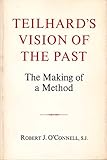Teilhard's Vision of the Past : The Making of a Method / Robert J. O'Connell.
Material type: TextPublisher: New York, NY : Fordham University Press, [2022]Copyright date: ©1982Description: 1 online resource (205 p.)Content type:
TextPublisher: New York, NY : Fordham University Press, [2022]Copyright date: ©1982Description: 1 online resource (205 p.)Content type: - 9780823210909
- 9780823296729
- online - DeGruyter
| Item type | Current library | Call number | URL | Status | Notes | Barcode | |
|---|---|---|---|---|---|---|---|
 eBook
eBook
|
Biblioteca "Angelicum" Pont. Univ. S.Tommaso d'Aquino Nuvola online | online - DeGruyter (Browse shelf(Opens below)) | Online access | Not for loan (Accesso limitato) | Accesso per gli utenti autorizzati / Access for authorized users | (dgr)9780823296729 |
Frontmatter -- Abbreviations -- Contents -- Introduction -- 1 "Seeing": Teilhard and the "New Positivism" -- 2 Seeing With an Educated Eye -- 3 Seeing "Wholes" -- 4 Science as History and Product of History -- 5 Science, "Hypothesis," and the Reality of Evolution -- 6 Entropy vs. Evolution -- 7 Toward a New Science of the Past -- 8 Crisis and Faith: In Evolution -- 9 The Phenomenon of Man: A Scientific Memoire -- 10 Toward Evaluating Teilhard's Vision of the Past: The Appropriate Questions -- Afterword -- Bibliography -- Index
restricted access online access with authorization star
http://purl.org/coar/access_right/c_16ec
The Phenomenon of Man, by Pierre Teilhard de Chardin, has been characterized as metaphysics, poetry, and mysticism-virtually everything except what its author claimed it was: a "purely scientific mémoir." Professor O'Connell here follows up on a nest of clues, uncovered first in an early unpublished essay, then in the series of essays contained principally in The Vision of the Past. Those clues all point to Teilhard's intimate familiarity with the philosophy of science propounded by the celebrated Pierre Duhem. It was Duhem's central claim that science, to remain true to itself, must aim at establishing a genuine "natural classification" phenomenal reality. That insight, Professor O'Connell argues, guided Teilhard's lifelong effort to describe the "imposed reality-factors" which science in its variety of forms suggests as ingredients and operative at every phase in the evolutionary development of planet Earth. Limiting his focus to the way Teilhard unfolded his vision of the past, Professor O'Connell concludes that those who deprecate Teilhard as unscientific betray little awareness of how sophisticated his understanding of science truly was.
Mode of access: Internet via World Wide Web.
In English.
Description based on online resource; title from PDF title page (publisher's Web site, viewed 03. Jan 2023)


